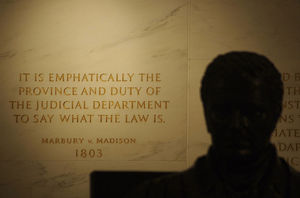Marbury v. Madison
Significance, Marbury Goes To Court, Marshall Proclaims The Doctrine Of Judicial Review, Justice Alfred Moore
Plaintiffs

William Marbury, William Harper, Robert R. Hooe, Dennis Ramsay
Defendant
James Madison, U.S. Secretary of State
Plaintiffs' Claim
That Madison had illegally refused to deliver judicial commissions to their rightful recipients.
Chief Lawyer for Plaintiffs
Charles Lee
Chief Defense Lawyer
Levi Lincoln, U.S. Attorney General
Justices for the Court
Samuel Chase, William Cushing, John Marshall (writing for the Court), William Paterson, Bushrod Washington
Justices Dissenting
None (Alfred Moore did not participate)
Place
Washington, D.C.
Date of Decision
24 February 1803
Decision
Plaintiffs could not force Madison to deliver the commissions because the Judiciary Act of 1789 was unconstitutional.
Related Cases
- Martin v. Hunter's Lessee, 14 U.S. 304 (1816).
- Cohens v. Virginia, 19 U.S. 264 (1821).
- Baker v. Carr, 369 U.S. 186 (1962).
- Michigan v. Long, 463 U.S. 1032 (1983).
- Honda v. Oberg, 512 U.S. 415 (1994).
Sources
West's Encyclopedia of American Law St. Paul, MN: West Group, 1998.
Additional topics
- Marbury v. Madison: 1803 - Marbury Goes To Court, Marshall Proclaims The Doctrine Of Judicial Review, Suggestions For Further Reading
- Marbury v. Madison - Further Readings
- Marbury v. Madison - Significance
- Marbury v. Madison - Further Readings
- Marbury v. Madison - Marbury Goes To Court
- Marbury v. Madison - Marshall Proclaims The Doctrine Of Judicial Review
- Marbury v. Madison - Justice Alfred Moore
- Other Free Encyclopedias
Law Library - American Law and Legal InformationNotable Trials and Court Cases - 1637 to 1832